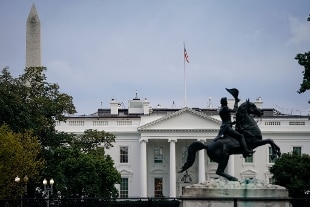Usa 2020, today the vote of the electors that will certify the victory of Joe Biden
Biden chooses the first African American to head the Pentagon.
US media: it is the former general Lloyd Austin
Trump ready to overshadow Biden settlement with rally to announce race in 2024
US intelligence: China has targeted the Biden team.
President-elect opens on nuclear deal
Biden-Harris summit for US return to Paris agreement on climate.
The elected President hears Guterres
Biden to the White House
Share
December 14, 2020The first Great Electors of the United States cast their vote to formally elect Joe Biden as the nation's 46th president.
The three Vermont representatives voted for Biden and Vice President Kamala Harris, while in Tennessee, 11 Electoral College representatives voted for Donald Trump and Vice President Mike Pence.
And four New Hampshire constituency votes went to Biden.
The 11 of Indiana instead went to Donald Trump.
Subsequently, for the Dem the 11 votes of Arizona and 16 of Georgia.
In Arizona, meeting in a secret location for fear of protests
In states where Donald Trump contests Joe Biden's victory, special security measures have been taken to protect the big voters who gather for the Electoral College vote.
And in Arizona, the place where the meeting took place was not even disclosed, according to the press office of the secretary of state.
In Michigan, on the other hand, the offices of the House and Senate have been closed to the public following "credible threats of violence" against the 16 voters who meet in the seat of the Legislative Assembly.
In Wisconsin, high voters will be escorted by police officers into the General Assembly building through a back door.
How the Electoral College Voting Works
The Americans voted for their new president on November 3, but the actual election will take place today, Monday, December 14, when the constituency's constituent voters meet. the head of state.
The process is as important as it is generally taken for granted, but this year the United States comes to it in a completely different political, institutional and social atmosphere, in the wake of Donald Trump's battle to question the legitimacy of the election. by Joe Biden.
The Supreme Court, by rejecting the Texas appeal, supported by Trump himself, seems to have closed the game, if not the question.
Today the big voters should confirm Biden's victory with little surprise.
Here's what to know about the Electoral College and the meeting.
How many are they and who to vote
Under the US Constitution, each state has a number of voters equal to its representatives in Congress.
The District of Columbia has three voters and is treated as a state.
In all, there are 538 electors. Except Maine and Nebraska, the states assign all their votes in the constituency to the winner of the popular vote in the state. In theory, whoever wins the popular vote can lose the election, as happened in 2000 ( George W. Bush prevailed over Al Gore) and in 2016, when Trump took over the White House despite Hillary Clinton getting three million more votes on election day.
Joe Biden won the popular vote and won 306 electoral votes compared to Donald Trump's 232.
Who are the big voters
Generally they are officials, politicians or aspiring politicians, long-time exponents of the parties.
The eldest this year is 93-year-old "Pete" McCloskey, a Biden voter but a former Republican congressman, who tried to run for president against Richard Nixon in 1972.
Where and when they meet
The Electoral College does not meet in one place, but the delegates vote in the capitals of their states.
Nevada has called a virtual meeting via Zoom for its 6 voters, others have not specified.
Since the Constitution does not indicate a timetable, each state does it according to its own decisions and some states do not provide a timetable, so the process is spread over the whole day.
The rules of voting
Grand voters are not forced by federal law to vote for a specific candidate.
Instead, state-level laws or formal promises to be signed in 32 states and in the District of Colombia provide for it.
In the event of a 'change of jacket', not all states provide for sanctions: there are laws on this in five states, with sentences of up to one year in prison or fines of up to $ 1,000.
In American electoral history it has happened that members of the Electoral College voted for a candidate other than the one they had won in their state, but it never happened that this changed the outcome of the presidential election.
To date, 165 unfaithful voters have been counted in over two centuries of elections.
What happens after the vote
Electorate voters vote separately for the president and the vice president.
Votes are recorded on a 'Voting Certificate' and a 'Certificate of Assessment' (presidential candidate list) and are sent to Congress and the National Archives as legal documentation of the presidential election.

